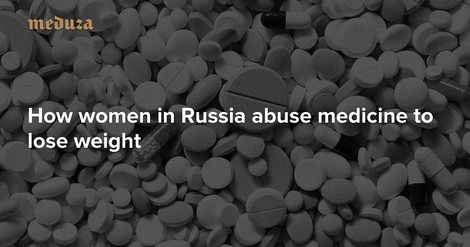Your podcast discovery platform
Curious minds select the most fascinating podcasts from around the world. Discover hand-piqd audio recommendations on your favorite topics.

piqer for: Deep Dives Global finds Globalization and politics Health and Sanity
Daria Sukharchuk is a journalist based in Berlin, where she works as a news anchor for Russian-language OstWest.tv. Her writing has appeared in Motherboard and ZEIT Online, Cosmopolitan, as well as Afisha (Moscow's leading city magazine). She specializes on the topic of human rights, migration, and mental health.
She has her BA in Chinese history, and, never having forgotten her history background, has also contributed to the educational project1917.com.
How Women With Eating Disorders Abuse Prescription Drugs To Lose Weight
"I have always felt fat"; "My boyfriend left me, and said I was fat"—this is a common beginning of the stories of many young women with eating disorders who have tried to lose weight, and, looking for a "magic pill", discovered prescription drugs.
In Russia, it is pretty easy to get drugs such as strong diuretics, laxatives, antidepressants, and tranquilisers. Many pharmacies sell them without a prescription, and prescriptions are easy to fake. Psychiatric care, meanwhile, is hard to get—especially in provincial towns. For a teenage girl unhappy with her body, it is much easier to find an online community about anorexia, than get help. In VK, Russia's biggest social network, there are hundreds of groups like that, and they include tens of thousands of active users. They give those girls a platform where they can discuss new extreme diets and mixes of pills, such as "ECA"—ephedrine, caffeine, and aspirin—or sell and buy strong diuretics, such as furosemide (normally used in hospitals in cases of extreme edema, it can make a heart stop due to extreme loss of electrolytes). These drugs help users skip meals, and extreme dehydration caused by furosemide can make one look thinner. But they also aggravate eating disorders by adding an addiction into the mix: people who have abused strong diuretics and laxatives for a long time cannot relieve themselves without the chemical stimulation.
None of this is a secret, and yet young girls (many of whom already have an eating disorder) often run the risk of abusing drugs, just to fit into some unattainable beauty standard. It doesn't help that Russia, being a largely conservative country, still places great value on a woman's attractiveness, does precious little to regulate advertising (it is not uncommon to see a bank advertising "huge" credit with a picture of a woman with big breasts), and practically nothing to battle sexism.
Stay up to date – with a newsletter from your channel on Health and Sanity.
